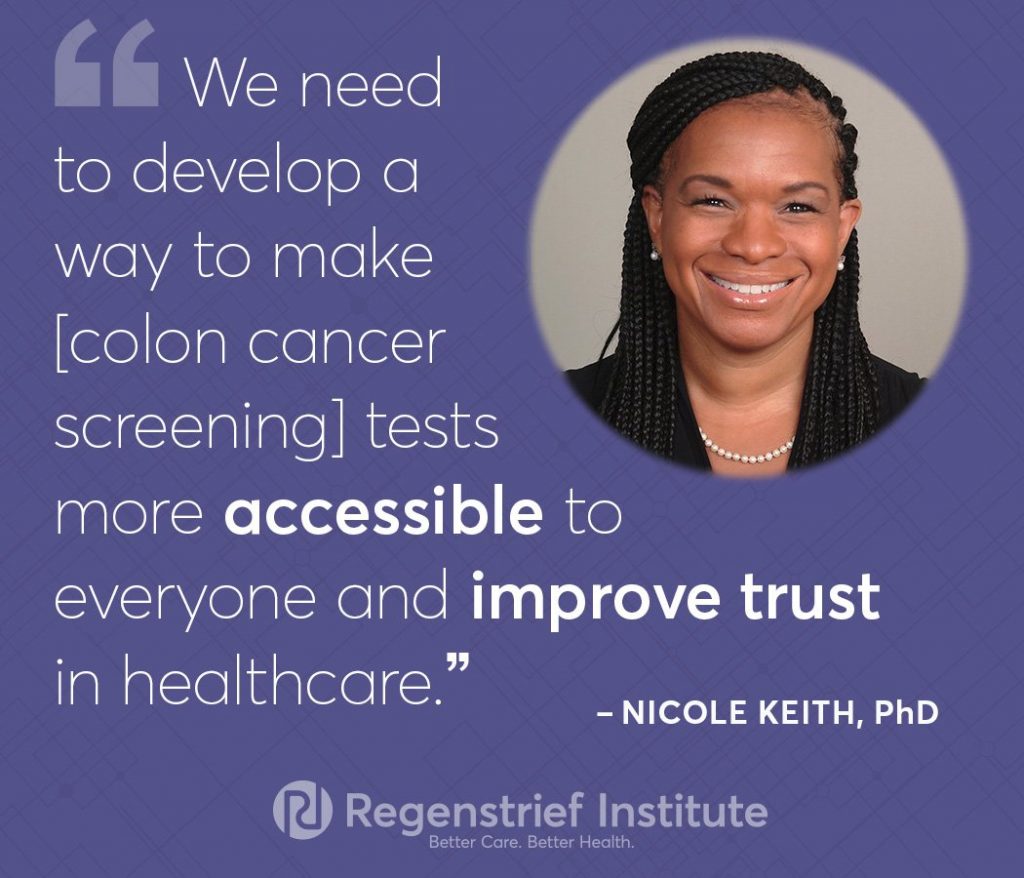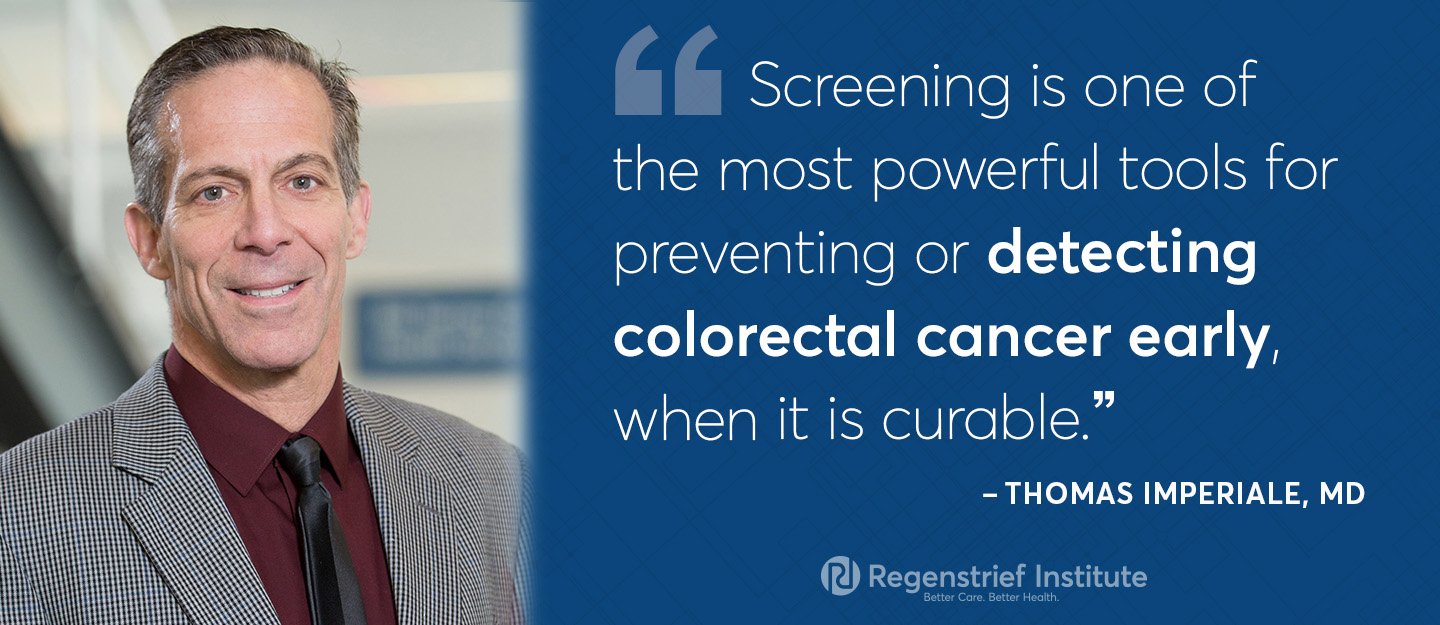Black people have a higher risk of colorectal cancer than white people, but this risk is likely not due to genetics. Data from a recent study by researchers from the U.S. Department of Veterans Affairs, Regenstrief Institute and Indiana University School of Medicine adds more data to the existing evidence.
“The next step is determining what is behind this increased risk,” said lead author Thomas Imperiale, M.D., Regenstrief Institute research scientist, VA investigator and professor of gastroenterology and hepatology at IU School of Medicine. “Lifestyle and healthcare-related behaviors may explain some of the difference.”
In the study, the research team looked at more than 90,000 veterans who underwent a colonoscopy at 18 VA facilities during a seven-year period. In the overall study population, Black veterans had a higher risk of colorectal cancer. However, in a subgroup of people who got routine screenings, the risk was equal for Black patients and white patients, which suggests that the difference is not biological.
“It could be that Black patients are not getting screened, as suggested by guidelines, or that they respond to early symptoms differently, perhaps delaying seeking treatment for symptoms of colorectal cancer longer than white patients do,” said Dr. Imperiale. “Screening is one of the most powerful tools for preventing or detecting colorectal cancer early, when it is curable.”
 Regenstrief Research Scientist NiCole Keith, PhD, who was not involved in this project, studies health disparities.
Regenstrief Research Scientist NiCole Keith, PhD, who was not involved in this project, studies health disparities.
“Often, Black patients do not have access to screening or the ability to attend an appointment. Historically, this population has also had trust issues with healthcare, all of which could contribute to these disparities,” said Dr. Keith. “We need to develop a way to make these important tests more accessible to everyone and improve trust in healthcare.”
The study also found that the risk of colorectal cancer increases for all patients with age.
“Prevalence of Advanced Colorectal Neoplasia in Veterans: Effect of Age, Sex, and Race/Ethnicity” was published online ahead of print in the Journal of Gastroenterology. This work was supported by IIR 08-062, Health Services Research and Development, Veterans Administration.
In addition to Dr. Imperiale, other authors are Joanne K. Daggy, PhD of IU School of Medicine; Timothy D. Imler, M.D. of Regenstrief Institute and IU School of Medicine; Eric A. Sherer, PhD of Louisiana Tech University; Charles J. Kahi, M.D., MSc of IU School of Medicine and the VA HSR&D Center for Innovation, Richard L. Roudebush VAMC; Jason Larson, M.A. of VA HSR&D Center for Innovation, Richard L. Roudebush VAMC; Jon Cardwell, M.S. of VA HSR&D Center for Innovation, Richard L. Roudebush VAMC; Cynthia S. Johnson, M.A. of IU School of Medicine; Dennis J. Ahnen, M.D. of University of Colorado and Denver VAMC; Fadi Antaki, M.D. of Wayne, State University and John D. Dingell VAMC; Christopher Ashley, M.D. of Albany VAMC; Jason A. Dominitz, M.D., MHS of University of Washington and VA Puget Sound Health Care System ; Mae Go, M.D., PhD of University of Las Vegas and VA Southern Nevada Health Care System; Jason Hou, M.D. of Baylor University and Michael E. DeBakey VAMC; Mark A. Korsten, M.D. of James J. Peters VA Medical Center and Icahn School of Medicine at Mt. Sinai; Douglas J. Robertson, M.D. of Geisel School of Medicine at Dartmouth, The Dartmouth Institute and the White River Junction VAMC; Sameer Saini, M.D., M.S. of University of Michigan and VA Ann Arbor Healthcare System; and Amandeep Shergill, M.D., M.S. of University of California at San Francisco and San Francisco VAMC.
About Richard L. Roudebush Veterans Affairs (VA) Medical Center
Established in 1932, the Richard L. Roudebush VA Medical Center serves Veterans from across Indiana and western Illinois. The Roudebush VAMC is one of the largest and most complex medical centers in the Department of Veterans Affairs, and provides acute inpatient medical, surgical, psychiatric, rehabilitation, and neurological care to more than 60,000 Veterans annually. Some of the many services available to Veterans include emergency medicine, primary care, cardiac care, radiation oncology, audiology, community-based extended care and community VA clinics.
About Regenstrief Institute
Founded in 1969 in Indianapolis, the Regenstrief Institute is a local, national and global leader dedicated to a world where better information empowers people to end disease and realize true health. A key research partner to Indiana University, Regenstrief and its research scientists are responsible for a growing number of major healthcare innovations and studies. Examples range from the development of global health information technology standards that enable the use and interoperability of electronic health records to improving patient-physician communications, to creating models of care that inform practice and improve the lives of patients around the globe.
Sam Regenstrief, a nationally successful entrepreneur from Connersville, Indiana, founded the institute with the goal of making healthcare more efficient and accessible for everyone. His vision continues to guide the institute’s research mission.
About IU School of Medicine
IU School of Medicine is the largest medical school in the U.S. and is annually ranked among the top medical schools in the nation by U.S. News & World Report. The school offers high-quality medical education, access to leading medical research and rich campus life in nine Indiana cities, including rural and urban locations consistently recognized for livability.
About Thomas Imperiale, M.D.
In addition to his role as a research scientist at Regenstrief Institute, Thomas F. Imperiale, M.D., is a core investigator for the U.S. Department of Veterans Affairs Health Services Research and Development Center for Health Information and Communication, Richard L. Roudebush VA Medical Center. He is the Lawrence Lumeng Professor of Gastroenterology and Hepatology at Indiana University School of Medicine as well.
About NiCole Keith, PhD
In addition to her role as a Regenstrief research scientist, NiCole Keith, PhD, is the associate dean of faculty affairs and a professor at the Indiana University School of Health and Human Services at IUPUI. Dr. Keith is also the 2020-2021 president of the American College of Sports Medicine.
About the VA Health Services Research and Development Center for Health Information and Communication
The Health Services Research and Development (HSR&D) Center for Health Information and Communication (CHIC) group is a diverse cadre of researchers joining together to transform the healthcare system, both within and outside the VA so every patient receives consistent, high-quality care.









